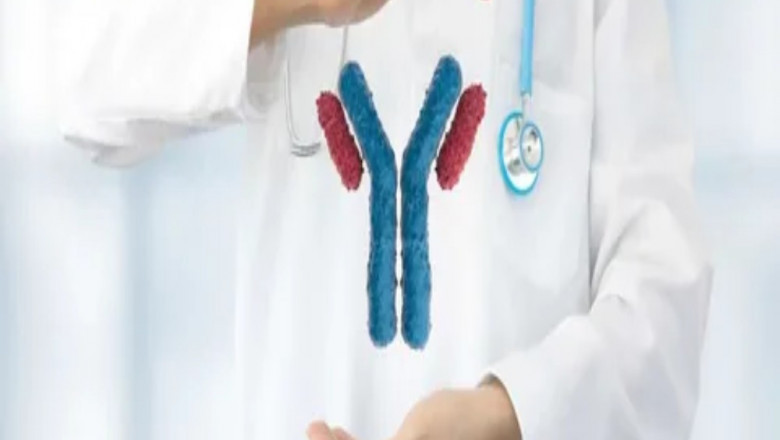views
History and Development of Monoclonal Antibodies
Monoclonal antibodies (mAbs) are engineered antibodies that are derived from a single clone and bind to a specific antigen on cells. Since the 1970s, researchers have worked to harness the power of antibodies in targeting and treating diseases like cancer. The first breakthrough came in 1975 when scientists devised a technique for fusing myeloma cells with spleen cells from immunized mice to generate hybridomas that could produce monoclonal antibodies indefinitely. This "hybridoma technology" paved the way for mass production of engineered antibodies that reacted with a single antigen.
In the 1980s and 1990s, researchers utilized this technology to develop the first mAbs targeting cancer-specific antigens. These early mAbs demonstrated promise in laboratory settings but also highlighted challenges in translating the approach to patients. Advances in recombinant DNA technology and hybridoma techniques in the late 20th century allowed scientists to "humanize" mouse antibodies, reducing immune reactions in humans. This helped move antibody therapies into clinical testing and eventual approval starting in the late 1990s.
Mechanisms of Action and Formats
Cancer Monoclonal Antibodies work through several mechanisms to fight cancer including blocking tumor growth signals, inducing immune responses, and delivering cytotoxic drugs directly to tumors. The main formats of approved therapeutic mAbs include:
- Naked or unconjugated mAbs that block growth-promoting receptors on tumors. Examples include trastuzumab for HER2-positive breast cancer.
- Antibody-drug conjugates where cytotoxic chemotherapies are attached to mAbs, allowing drug delivery directly into cancer cells. Kadcyla is an ADC for HER2 breast cancer.
- Bispecific T cell engagers that recruit immune T cells to kill cancer cells. Blinatumomab is a bispecific T cell engager approved for acute lymphoblastic leukemia.
Targeted Therapy Options Across Cancer Types
As understanding of cancer immunology and molecular targets has advanced, the range of cancer types treatable with mAbs has expanded dramatically. Some key monoclonal antibodies and their approved cancer indications include:
- Rituximab for B cell non-Hodgkin's lymphoma and chronic lymphocytic leukemia by targeting CD20 antigen
- Trastuzumab for HER2-positive breast and gastric cancers
- Cetuximab for head and neck and colorectal cancers by blocking EGFR receptor
- Alemtuzumab for chronic lymphocytic leukemia targeting CD52 antigen.
- Bevacizumab inhibits VEGF receptor signaling in colorectal, lung, breast and ovarian cancers.
- Pembrolizumab and nivolumab bolster immune response against tumors by blocking PD-1 receptor interaction. Used broadly in lung, skin, bladder and other solid tumors.
Combination Strategies Maximize Benefits
While monoclonal antibodies can produce durable responses as monotherapy, combining them with chemotherapy, radiation, targeted drugs or immunotherapy often amplifies their effectiveness. Some key combination strategies include:
- Adding trastuzumab or pertuzumab to chemotherapy for HER2-positive breast cancer
- Combining rituximab with chemotherapy as standard first-line treatment for non-Hodgkin's lymphoma
- Using bevacizumab with chemotherapy as a first-line option for metastatic colorectal cancer
- Pairing pembrolizumab or nivolumab with chemotherapy or other drugs in lung, skin and bladder cancers
- Administering durvalumab after chemoradiation for non-small cell lung cancer
Advancing Delivery Methods and Next-Gen Formats
Scientists continuously work to refine monoclonal antibodies and related technologies. Areas of ongoing research include improving formats like antibody-drug conjugates, developing bispecific T cell engagers targeting multiple antigens, engineering CAR T cells with antibody-derived targeting receptors, and employing nanobodies or antibody fragments to penetrate tumors.
Next-generation delivery methods under study involve conjugating antibodies to drug-loaded nanoparticles, exosomes, or inorganic nanoparticles for intracellular drug release. Other experimental concepts involve fusing mAbs to enzymes for prodrug activation, or radiolabeling antibodies for tumor radiation therapy. Through these ongoing advancements, monoclonal antibodies aim to transform more cancer types into chronic illnesses.
Managing Adverse Events Optimizes Safety
While generally well-tolerated, monoclonal antibodies can potentially cause infusion reactions, cardiovascular events, and immune-mediated side effects. Careful patient selection and monitoring aims to mitigate risks. Pre-treatment with antihistamines and steroids reduces infusion reactions to naked antibodies. Regular cardiac screening accompanies HER2-targeted regimens given potential cardiotoxicity. Managing immune-related adverse events also relies on guidelines for resumption or discontinuation of checkpoint inhibitor therapy. With appropriate risk mitigation strategies, monoclonal antibodies’ benefits appear to outweigh safety concerns for most eligible patients.
Over four decades after their conception, monoclonal antibodies remain at the forefront of precision cancer therapies. Targeting receptors driving tumor growth, recruiting the immune system, and delivering toxins directly inside cancer cells, mAbs have transformed treatment landscapes. Continued research further optimizes these agents by improving formats, combining strategically, developing biomarker tests to guide patient selection, and managing adverse reactions. As cancer immunity and targeted therapies advance in tandem, monoclonal antibodies aim to turn more cancers into manageable long-term conditions.
Get This Report in Japanese Language: 癌モノクローナル抗体
Get This Report in Korean Language: 암 단일 클론 항체
About Author:
Vaagisha brings over three years of expertise as a content editor in the market research domain. Originally a creative writer, she discovered her passion for editing, combining her flair for writing with a meticulous eye for detail. Her ability to craft and refine compelling content makes her an invaluable asset in delivering polished and engaging write-ups.
(LinkedIn: https://www.linkedin.com/in/vaagisha-singh-8080b91)






















Comments
0 comment